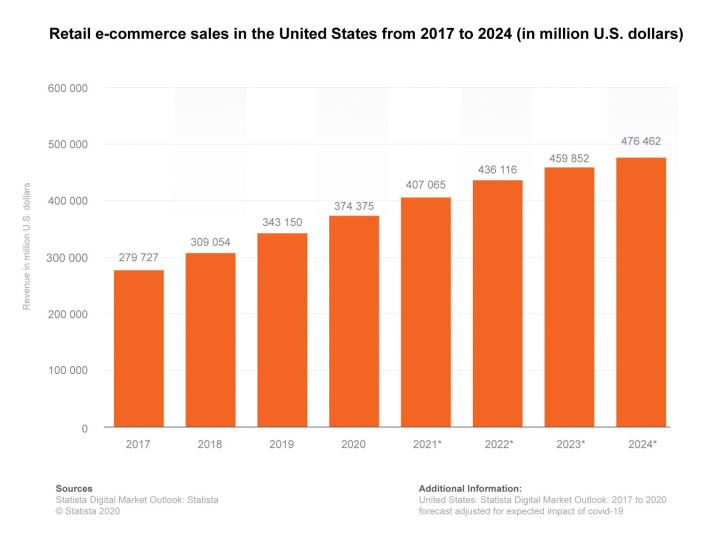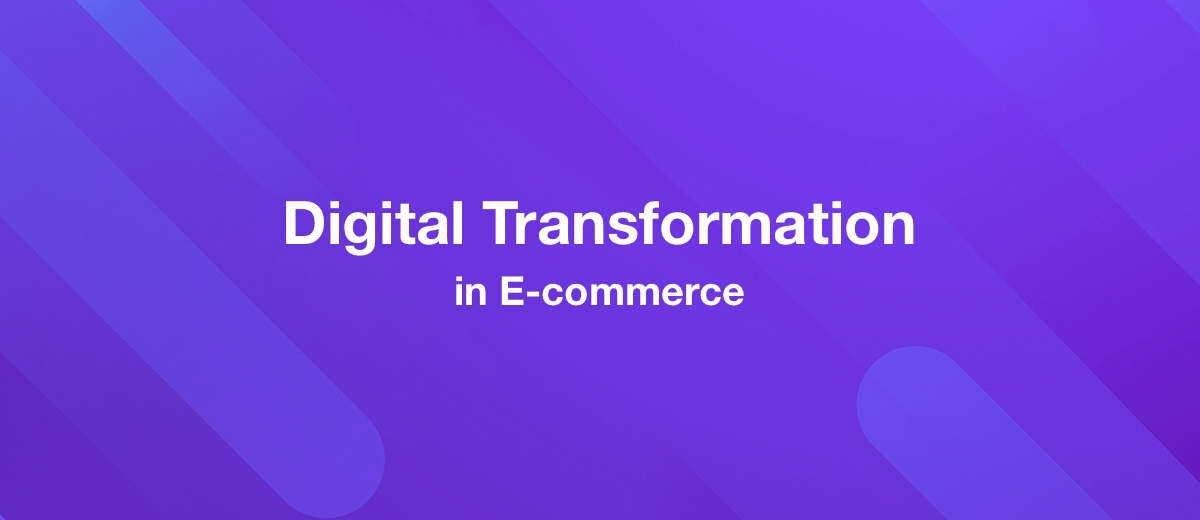The Role of Digital Transformation in E-commerce
Digital transformation is a never-ending journey, and you must cultivate many partners on both the supplier and consumer sides.
Content:
1. The Role of Digital Transformation
2. Let’s define digital transformation
3. How will digital transformation impact eCommerce?
4. Six ways in which digital transformation will change eCommerce
5. Will digital transformation have any tangible impact on the future of eCommerce?
The global eCommerce market is expected to achieve a compound annual growth rate of 11.1% from 2018 through 2025, reaching a value of up to $24,265.12 billion by the end of this period. By 2025, the B2B eCommerce market will be the fastest-growing sector of eCommerce.
The e-commerce industry is being revolutionized by digital transformation. In other words, digital transformation is the process of using digital technology to develop new or modified business processes, products, and services.
It might be used to enhance performance or expand into new sectors. To put it another way, this is all about using digitalization to effect real change inside a business.
Many e-commerce firms, on the other hand, are doing just that. They may provide a better client experience, increase operational efficiency, and expand into new markets due to digital transformation.
The Role of Digital Transformation
One of the most significant advantages of digital transformation for e-commerce businesses is the ability to offer a better customer experience. Thanks to new technologies, companies can gather more data on their customers and use this data to personalize the shopping experience.

For example, they can recommend products the customer is likely interested in or offer discounts and deals relevant to the customer’s purchase history.
In addition, digital transformation can help e-commerce businesses to increase their operational efficiency. By automating processes and using artificial intelligence (AI), companies can free up employees’ time to focus on more critical tasks. For example, AI can be used for handling customer queries or to process orders and payments.
Finally, digital transformation can also help e-commerce businesses to enter new markets. Thanks to the internet's global reach, companies can now sell their products and services to customers worldwide.
In addition, they can use digital marketing techniques to target specific markets and demographics.
Let's take a closer look at how e-commerce is being impacted by digital transformation.
Let’s define digital transformation
Digital transformation refers to the process of transforming decision-making with the infusion of the workable and latest technology into its operations.
How will digital transformation impact eCommerce?
As an eCommerce business owner, digital transformation has no endpoint. You need to constantly keep track of and evolve based on consumer expectations and behavior shifts so that your products and strategies can meet and exceed the demographic's needs.
It is also essential to be on top of what competitors are doing and, wherever possible, outperform them. When crafting a digital marketing strategy, approach it positively and without fear. The more you invest in it now, the bigger the rewards you will reap.
Six ways in which digital transformation will change eCommerce
1. DTC selling will accelerate, and you won't have to deal with an intermediary
Most companies (particularly new ones) have traditionally developed partnerships with significant brick-and-mortar retail outlets on a wholesale basis. Direct-to-consumer business models can help firms make more money and get to know their customers better, with retail analytics becoming fundamental for these businesses.


On the one hand, consumers communicate directly with companies; on the other, brands react promptly and effectively assist. In reality, over 55% of customers want DTC companies to give them a personalized experience and specific goods.
Furthermore, DTC businesses are anticipated to develop a new generation of devoted brand evangelists who enthusiastically promote their favorite items and thus bring in new consumers.
2. Big data will have a significant impact on personalization
Ecommerce businesses, such as Amazon, have taken advantage of big data to give customers highly customized buying experiences. This is achieved through machine learning, which may alter website algorithms based on past consumer behavior and provide tailored recommendations.
It's also worth noting that many clients see such monitoring as an invasion of their privacy and may opt-out of personalized ads.
However, for the time being, personal assistants such as Internet of Things (IoT) gadgets still hold a place in people's hearts, and you may incorporate a dash of that into your business by adding product suggestion integrations to your website. By using augmented reality, you can break down the barriers to online shopping.
3. Augmented reality eliminates the constraints of online shopping
Integration of augmented reality into an eCommerce website and mobile platform enables shoppers to visualize their favorite products rather than just looking at a stock image of the same and reading its description.
AR is a game-changer for eCommerce as it will be an add-on to the personalization of customer experience.
4. Merchants will have more options with the help of Headless and API-driven eCommerce
Customer order preferences are neatly filed away in a database behind the scenes of most eCommerce websites via a headless eCommerce system.
Such a mechanism, in other words, separates a firm's eCommerce platform from its frontend, allowing backend data to be sent effortlessly to a variety of frontends via APIs.
The next generation of automated shopping is Headless eCommerce. It's SEO-friendly, adaptable, and quick across many devices and makes multi-region platforming easier. Cross-device personalized purchasing is also more straightforward thanks to it.
5. Businesses will focus more on optimization
CRO, or conversion rate optimization, is just as important for your website as good SEO. While SEO methods bring people to your site, CRO tactics convert them into customers.
CRO is a method for improving website performance that emphasizes iterative optimization, which involves making tiny changes to a website and then assessing the results.
Small changes, such as page design adjustments, more creative product descriptions, improved navigation options, and faster checkout processes, help simplify purchasing and boost conversion rates.
Will digital transformation have any tangible impact on the future of eCommerce?
Ecommerce has long been a winner in terms of profit. By 2024, economists forecast retail ecommerce sales in the United States to reach 476.5 billion dollars, up from 279.7 billion dollars today.

Digital transformation is a never-ending journey, and you must cultivate many partners on both the supplier and consumer sides. It's not like saying, "We're at our limits here; we can't go any further." It's an ongoing adventure that will require eCommerce businesses to build numerous partnerships on both the supplier and customer sides.
Online commerce is where firms have gambled big and reaped huge rewards from an internet presence regarding consumer opinions, market share, and profitability while keeping operational costs to a bare minimum.
Remember that using our ApiX-Drive online connector, you can automate processes on your own without any coding or special skills required. Be sure to check out our step-by-step guides to set up the integrations:

